Old Testament
Genesis Exodus Leviticus Numbers Deuteronomy Joshua Judges Ruth 1 Samuel 2 Samuel 1 Kings 2 Kings 1 Chronicles 2 Chronicles Ezra Nehemiah Esther Job Psalms Proverbs Ecclesiastes Song of Solomon Isaiah Jeremiah Lamentations Ezekiel Daniel Hosea Joel Amos Obadiah Jonah Micah Nahum Habakkuk Zephaniah Haggai Zechariah MalachiJob 20:28 Similar Verses
Job 20:28 Cross References
The increase of his house shall depart, and his goods shall flow away in the day of his wrath.
Uncover the Rich Themes and Topics of This Bible Verse
Listed below are the Bible themes associated with Job 20:28. We invite you to explore each theme to gain deeper insights into the Scriptures.
Job 20:28 Cross Reference Verses
This section features a detailed cross-reference designed to enrich your understanding of the Scriptures. Below, you will find carefully selected verses that echo the themes and teachings related to Job 20:28 KJV. Click on any image to explore detailed analyses of related Bible verses and uncover deeper theological insights.
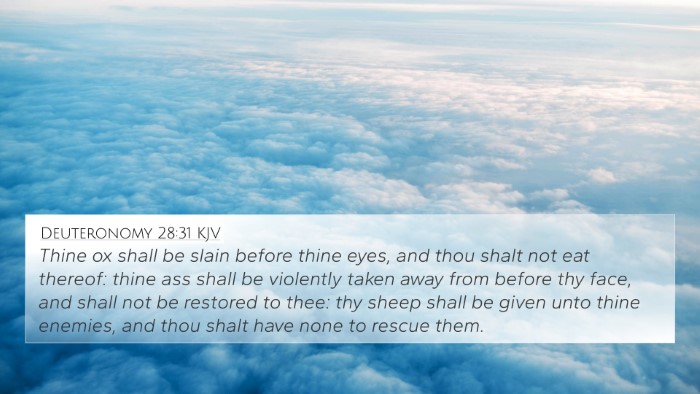
Deuteronomy 28:31 (KJV) »
Thine ox shall be slain before thine eyes, and thou shalt not eat thereof: thine ass shall be violently taken away from before thy face, and shall not be restored to thee: thy sheep shall be given unto thine enemies, and thou shalt have none to rescue them.
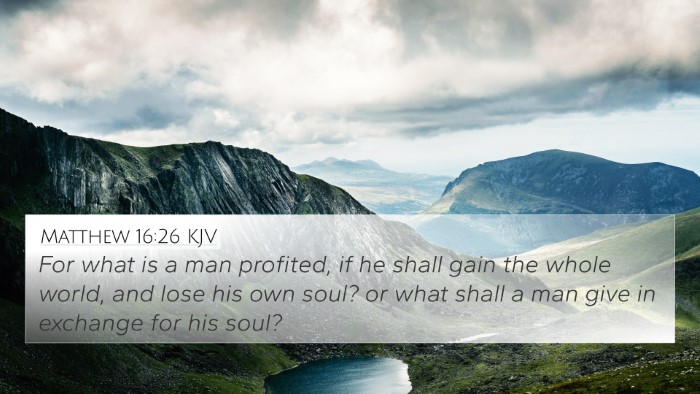
Matthew 16:26 (KJV) »
For what is a man profited, if he shall gain the whole world, and lose his own soul? or what shall a man give in exchange for his soul?
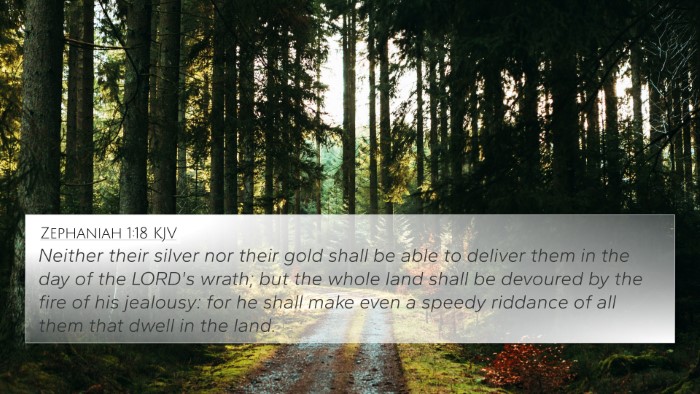
Zephaniah 1:18 (KJV) »
Neither their silver nor their gold shall be able to deliver them in the day of the LORD's wrath; but the whole land shall be devoured by the fire of his jealousy: for he shall make even a speedy riddance of all them that dwell in the land.
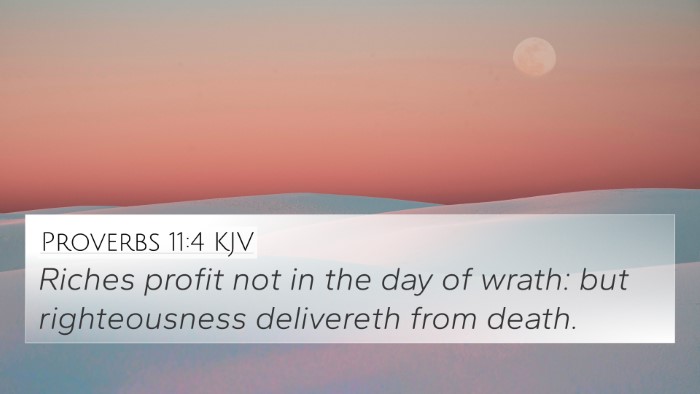
Proverbs 11:4 (KJV) »
Riches profit not in the day of wrath: but righteousness delivereth from death.

Job 20:18 (KJV) »
That which he laboured for shall he restore, and shall not swallow it down: according to his substance shall the restitution be, and he shall not rejoice therein.

Job 5:5 (KJV) »
Whose harvest the hungry eateth up, and taketh it even out of the thorns, and the robber swalloweth up their substance.
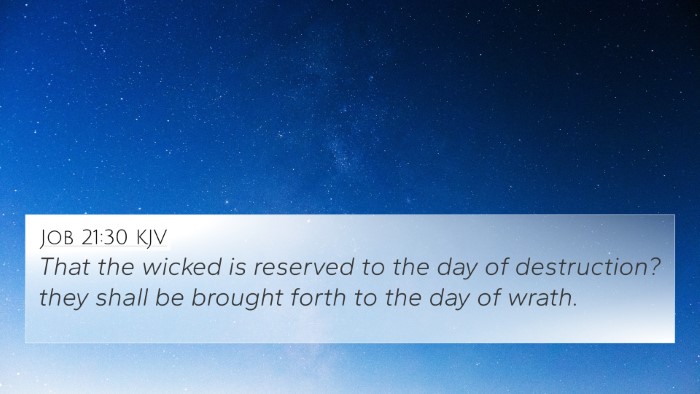
Job 21:30 (KJV) »
That the wicked is reserved to the day of destruction? they shall be brought forth to the day of wrath.
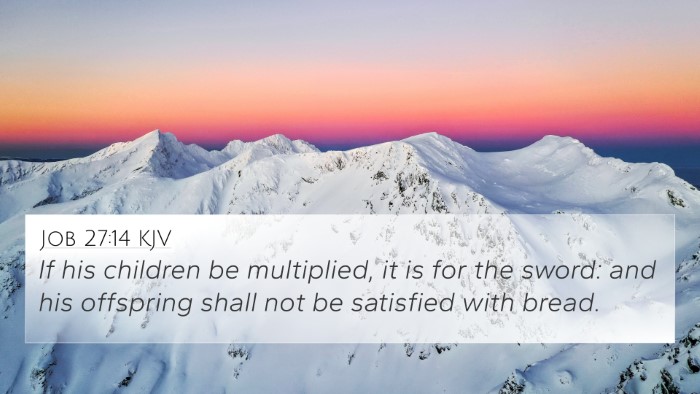
Job 27:14 (KJV) »
If his children be multiplied, it is for the sword: and his offspring shall not be satisfied with bread.
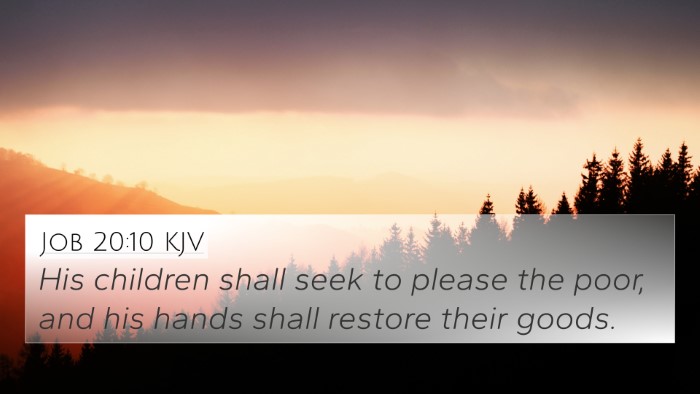
Job 20:10 (KJV) »
His children shall seek to please the poor, and his hands shall restore their goods.
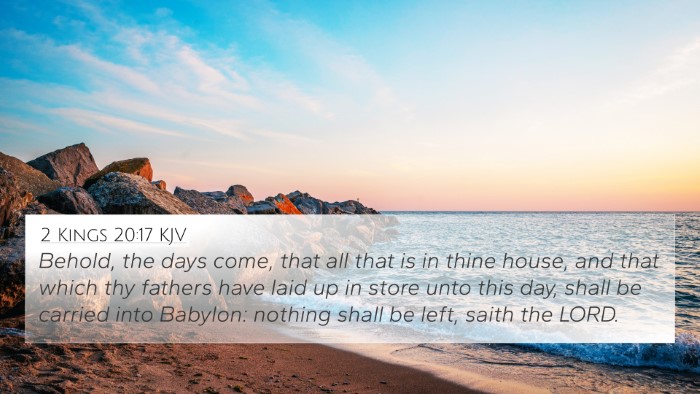
2 Kings 20:17 (KJV) »
Behold, the days come, that all that is in thine house, and that which thy fathers have laid up in store unto this day, shall be carried into Babylon: nothing shall be left, saith the LORD.

Revelation 18:17 (KJV) »
For in one hour so great riches is come to nought. And every shipmaster, and all the company in ships, and sailors, and as many as trade by sea, stood afar off,
Job 20:28 Verse Analysis and Similar Verses
Understanding Job 20:28
Job 20:28 states, "The increase of his house shall depart, and his goods shall flow away in the day of his wrath." This verse, situated within Zophar's speech to Job, highlights themes of divine justice, the transient nature of material wealth, and the ultimate fate of the wicked.
Summary of Meaning
This verse underscores the principle that material possessions are fleeting and that the wrath of God has the power to strip away all that one has accumulated. Zophar, one of Job’s friends, argues that the wicked may seem to prosper for a time, but ultimately, they will face divine judgement resulting in loss.
Insights from Public Domain Commentaries
Matthew Henry's Commentary
According to Matthew Henry, the phrase "the increase of his house shall depart" implies that the prosperity of the ungodly will be short-lived. He connects this to the broader biblical narrative of God's strong opposition to the pride of the wicked. Henry emphasizes that just as wealth can be easily gained, it can also be swiftly lost, especially as a consequence of divine judgment.
Albert Barnes' Notes on the Bible
Albert Barnes comments on the futility of storing wealth without regard to the moral implications of one's actions. He interprets "his goods shall flow away" as a metaphor for the inevitable loss that accompanies God’s judgment on the sinful. Barnes often makes parallels highlighting that prosperity is not a sign of God’s favor but can often mask an impending judgement.
Adam Clarke's Commentary
Adam Clarke expands on the theme of divine justice, noting that the transfer of wealth from the wicked signifies God’s wrath manifesting in their lives. Clarke emphasizes that the flow of riches, which can seem secure, is ultimately governed by God's will. He asserts that wisdom lies in recognizing the temporary nature of earthly gains.
Bible Cross References
Job 20:28 connects with several other biblical passages, illustrating the themes of divine justice and the impermanence of wealth. Here are notable cross-references:
- Proverbs 23:5 - "Will you set your eyes on that which is not? For riches certainly make themselves wings; they fly away like an eagle toward heaven."
- Psalm 37:20 - "But the wicked shall perish, and the enemies of the Lord, like the splendor of the meadows, shall vanish. Into smoke they shall vanish away."
- Ecclesiastes 5:15 - "As he came from his mother’s womb, naked shall he return, to go as he came; and he shall take nothing from his labor that he may carry away in his hand."
- Luke 12:20 - "But God said to him, ‘Fool! This night your soul will be required of you; then whose will those things be which you have provided?'"
- James 5:1-3 - "Come now, you rich, weep and howl for your miseries that are coming upon you... your gold and silver are corroded, and their corrosion will be a witness against you..."
- Matthew 6:19-20 - "Do not lay up for yourselves treasures on earth, where moth and rust destroy, and where thieves break in and steal; but lay up for yourselves treasures in heaven..."
- 1 Timothy 6:7 - "For we brought nothing into this world, and it is certain we can carry nothing out."
Connections Between Bible Verses
The connections between Job 20:28 and the aforementioned verses create a thematic network emphasizing the temporary nature of earthly riches and the assurance of divine retribution against the wicked. In understanding these passages together, one can gain deeper insights into the moral and spiritual lessons communicated through scripture.
Thematic Bible Verse Connections
In comparing verses, a few critical themes emerge:
- The transience of wealth is a common thread linking these verses.
- The inevitability of divine judgment serves as a reminder of the accountability before God.
- Earthly losses depicted in these verses reflect a spiritual reality that transcends mere physical circumstances.
Tools for Bible Cross-Referencing
Utilizing tools for Bible cross-referencing such as a Bible concordance or cross-reference guide enhances understanding of Scripture. By exploring inter-Biblical dialogue, believers can identify rich connections among verses that illuminate their themes and messages.
How to Use Bible Cross-References
To effectively engage in cross-referencing:
- Begin with a particular verse of interest, such as Job 20:28.
- Use a Bible concordance to identify related verses.
- Cross-reference themes and keywords through a Bible reference resource or study tool.
- Take notes on how different verses reinforce the core message of divine justice and the ephemerality of wealth.
Conclusion
Job 20:28 invites reflection on the temporary nature of earthly possessions and the reality of divine judgement. By cross-referencing related scriptures, believers can deepen their understanding of biblical teachings on wealth, morality, and the consequences of one's actions. Engaging with these texts encourages discourse on the broader implications of faith and morality within the Christian experience.



